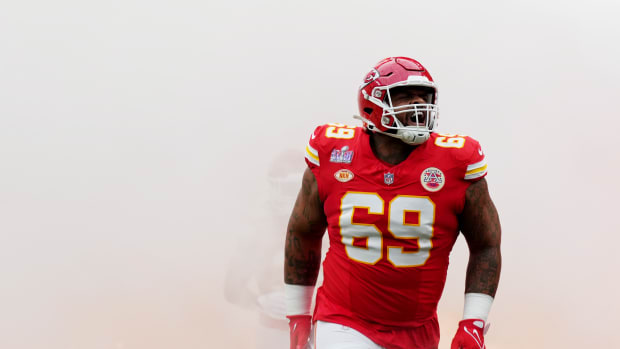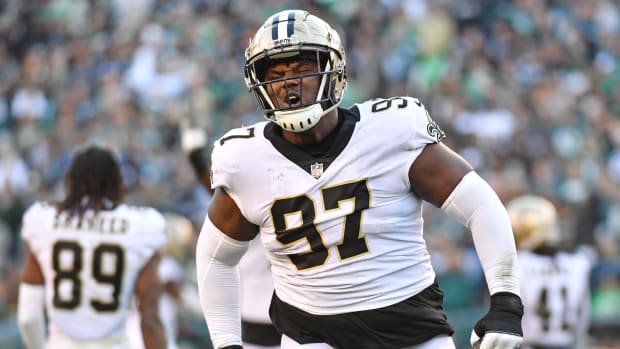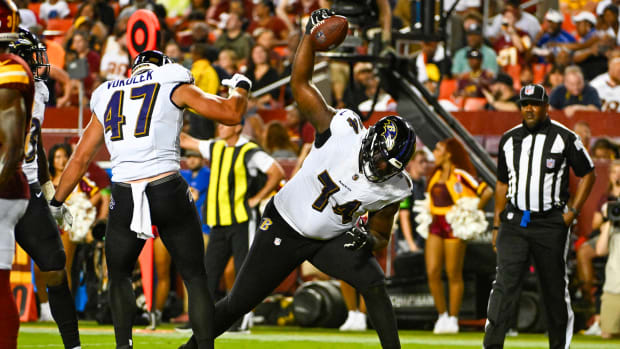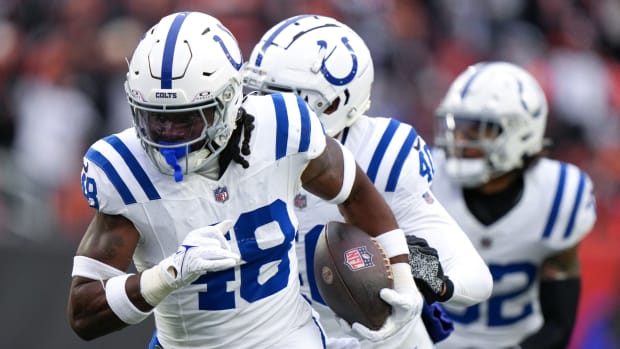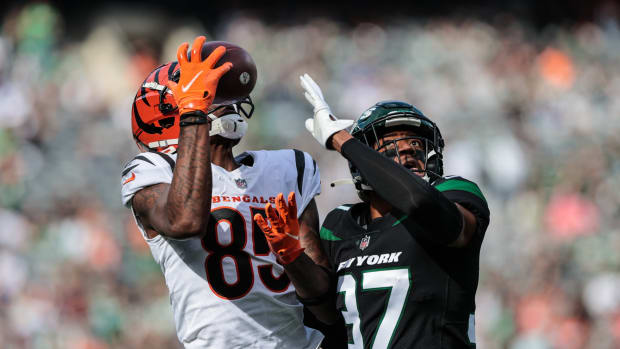
The Chargers Wasted Justin Herbert’s Rookie Contract, and the Future Looks Bleak
Justin Herbert will not be playing football again this season, thanks to reparative surgery on his broken finger, and so ends the last year of relative affordability before his massive contract extension tolls and begins hammering the Chargers’ salary cap. He will cost $19.3 million against the cap next season, a number that will nearly double in 2025 and then rapidly escalate from there.
What did Los Angeles get out of the most advantageous roster-building window in the sport? In four seasons: 31 wins, 32 losses and one playoff appearance that ended in the wild-card round.

Herbert is not going anywhere, but the roster around him is in need of an overhaul.
Kirby Lee/USA TODAY Sports
Before this moment, it was fair to label the Chargers a disappointment, but with Herbert officially removed from the equation, thus triggering a look ahead to the 2024 season and beyond, we may also think of the Chargers as an organization that is capable of wasting the entirety of Herbert’s career, not just his rookie contract.
It was sensible to surround Herbert with expensive veteran players up until this point, because that’s what teams do when there is a young passer on a cost-controlled rookie deal. However, the Chargers’ strategy was always a bit of a lemon in disguise, because those veteran players were homegrown talents such as Joey Bosa and Mike Williams, who, as good as they were, showed a propensity for wearing down or sustaining long-term injuries. (The high frequency of seemingly recurring injuries is another aspect of the Chargers’ organizational regimen that should be looked into more closely, but I digress.) Or, in some other cases, the Chargers carried over valued assets from previous regimes that may not have been schematic fits in the current one, or the lack of synergy between old rosters and new ideas forced the team to play in a kind of uncomfortable middle ground. The Chargers made a shift from a Gus Bradley defense in 2020 to a Brandon Staley, Vic Fangio–inspired look in ’21. They also let Shane Steichen walk to the Eagles and brought in Joe Lombardi, who did most of his meaningful work under Sean Payton and the Saints.
Right now, Los Angeles’s best players currently receiving paychecks from the team are almost all nearing or have already eclipsed the age of 30. Williams, who has an easy out in his contract, will turn 30 at the beginning of next season. Keenan Allen, as fantastic and regenerative as his 2023 campaign has been, will turn 32 before the draft and carries an $18 million base salary for next year, which will almost assuredly be reworked. Derwin James will turn 28 before the start of the ’24 regular season. Khalil Mack will be 33 just before the Super Bowl this year. Austin Ekeler, who will turn 29 just after the ’24 draft, is not under contract for next season. Corey Linsley, 32, is under contract for two more seasons, but his deal could be moved on from starting next year.
Looking at this roster, one might ask: After the inevitable flood of age and decline comes in and sweeps off the rest of the detritus, what will this team have to offer a quarterback who could be one of the five best players in the NFL under the correct circumstances but never seems to have gotten that chance?
The defensive line is mostly a group of mercenaries on short-term deals. Sebastian Joseph-Day is almost 29 and has a contract that can be wrangled out of before next season. Nick Williams is turning 34. Austin Johnson is 29. Backing them up? Fifth- and sixth-round picks from 2022 and ’23, respectively: Otito Ogbonnia (12 career games played, one start, two career QB hits) and Scott Matlock, who has appeared in eight games during his rookie season.
The linebacker position fares only slightly better. 2020 first-round pick Kenneth Murray Jr. had his fifth-year option declined, and behind him is Daiyan Henley, a third-round pick who has played in 4% of the team’s defensive snaps this year. Tuli Tuipulotu, a second-round pick from ’23, has shown some promise as a run defender and an edge rusher, and will almost certainly be a valued starter next year.
At the risk of boring you, most of the positions look this way. When we get to the most critical tenets of team-building, the cornerback position, the pass-rush situation, the offensive line and the playmaker set, we can really start to wonder what Herbert has to walk back into.
Outside of tackle Rashawn Slater, who is entering the fourth year of his own rookie deal and is about to get very expensive, and cornerback Asante Samuel Jr., a second-round pick who in his third season has shown signs of improvement and plays a heavy volume of snaps, the pillars are nonexistent. Rookie first-round receiver Quentin Johnston may be good, but the Chargers valued his height and projected route tree versatility that, like Williams, would come with time as he better understood his body and was better able to hone his speed. He is a project player who was thrust into action earlier than the Chargers would have liked. Isaiah Spiller has had exactly 18 carries in each of the past two years. Joshua Kelley possesses the ability to take over at the running back workload but would need to be re-signed, as his contract also expires at year’s end. Receiver Joshua Palmer, who has upside and was well-liked within the organization, has just one year left on his contract and is coming off injury.
Basically, the Chargers are going to force Herbert to be Patrick Mahomes—a player taking on a large portion of the burden after his contract extension kicks in as the team breaks in younger players on offense and supplements threadbare positions via the team’s most valuable draft capital—without a single playoff win before reaching that phase of his career.
We’re seeing now how demanding that emotional and physical lift can be for the greatest quarterback in the NFL, and, perhaps, when he is finished, one of the greatest quarterbacks in NFL history paired with one of the best coaches and one of the best tight ends in NFL history. Herbert doesn’t have that luxury. In fact, when you look at it, he doesn’t have much at all.

































